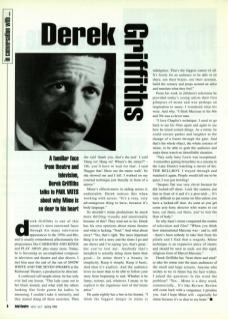Derek Griffiths is one of this country's most renowned faces through his many television appearances in the 1970s and 80s, and is usually remembered affectionately for programmes like Cabbages and Kings and Play Away plus many more. Today, he is becoming an accomplished composer in television and theatre and also directs. I met him near the end of the run of Snow White and the Seven Dwarves at the Richmond Theatre, a production he directed.
A confessed self-taught mime, he has only ever had one lesson. ‘This lady came out in her black leotard, and what with the others looking like little green fat ladies in mourning, I couldn't take it seriously, and they started doing all these exercises. Then she said “thank you, that's the end”. I said “Hang on! Hang on! Where's the mime?!” – “Oh, you'll have to wait for that.” I said, “Bugger that! Show me the mime walk.” So she showed me and I left. I worked on my external technique just literally in front of a mirror.’
Mime's effectiveness in aiding actors is undeniable. Derek notices this when working with actors. ‘It's a very, very advantageous thing to have, because it's body language.’
So shouldn't mime productions be much more thrilling visually and emotionally because of this? They tend not to be. Derek has his own opinions about mime theatre and what is lacking. ‘Soul.’ And what about story? ‘Yes, that's right. The most important thing is to tell a story and the times I go and see shows and I'm saying “yes, that's great but you've lost me.” Anybody that's inexplicit is actually doing more harm than good... In mime there's a beauty in simplicity. Keep it simple. Keep it basic. And then it's explicit. And the audience loves no more than to be able to follow your story from beginning to end. Whether it be funny, serious, sad, whatever. I mean, to be explicit is the ingenious tool of the mime artist.’
He quite rightly has a bee in his bonnet. ‘I think the biggest danger in mime is indulgence. That's the biggest cancer of all. It's lovely for an audience to be able to sit there, use their brains, use their acumen, build the scenery and props around an artist and translate what they feel.’
From his work in children's television he provided today's young artists their first glimpses of mime and was perhaps an inspiration to many. I wondered what his were. And why. ‘I think Marceau in the 60s and 70s was a clever man.’
‘I love Chaplin's technique. I used to go back to see his films again and again to see how he timed certain things. As a mime, he could extract pathos and laughter at the change of a frame through the gate. And that's the whole object, the whole essence of mime, to be able to grab the audience and make them watch an identifiable situation.’
‘Very early Jerry Lewis was exceptional. I remember getting bronchitis in a cinema in the Lake District watching a movie of his, The Bellboy. I stayed through and watched it again. People would tell me to be quiet, I was just howling!
‘Jacques Tati was very clever because he did locked-off shots. Lock the camera, put him in front of it and it's a pros-arch ... It's very difficult to put mime on film unless you have a locked-off shot. As soon as you get some arty-farty director who wants to cut here, cut there, cut there, you've lost the flow of body.’
So why hasn't mime conquered the realms of television and film? ‘When you think how international Marceau was – and is still – there's been nobody to take him from his plinth and I find that a tragedy. Mime technique is an expansive piece of elastic and should be seen as such, not this rigid, religious form of Marcel Marceau.’
Derek Griffiths has ‘been there and tried’ to take his mime into the mass audiences of the small and large screens. Anyone who wishes to try in future has his best wishes. I asked the question: is the word the problem? ‘Yes... Mime is a dirty word, commercially... It's like Revue. Revue will come back with a vengeance. I promise you. And I hope Mime will – especially for mime because it's so dear to my heart.’

